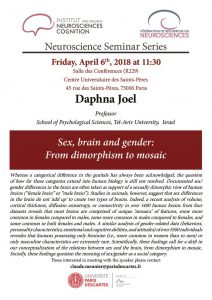événements, séminaires, vidéos
6 Avril – Daphna Joel – Sex, brain and gender: From dimorphism to mosaic
 Daphna Joel Professor, School of Psychological Sciences, Tel-Aviv University, Israel
Daphna Joel Professor, School of Psychological Sciences, Tel-Aviv University, Israel
title: Sex, brain and gender: From dimorphism to mosaic
![]() Video of the event (restricted to Paris descartes members).
Video of the event (restricted to Paris descartes members).
Neuroscience Seminar Series:
Friday, April 6th, 2018, 11:30 am, Salle des conférences (3rd Floor), Centre Universitaire des Saints-Pères, 45 rue des Saints-Pères, 75006 Paris
abstract:
Whereas a categorical difference in the genitals has always been acknowledged, the question of how far these categories extend into human biology is still not resolved. Documented sex/gender differences in the brain are often taken as support of a sexually dimorphic view of human brains (“female brain” or “male brain”). Studies in animals, however, suggest that sex differences in the brain do not ‘add up’ to create two types of brains. Indeed, a recent analysis of volume, cortical thickness, diffusion anisotropy, or connectivity in over 1400 human brains from four datasets reveals that most brains are comprised of unique ‘mosaics’ of features, some more common in females compared to males, some more common in males compared to females, and some common in both females and males. A similar analysis of gender-related data (behaviors, personality characteristics, emotional and cognitive abilities, and attitudes) of over 5500 individuals reveales that humans possessing only feminine (i.e., more common in women than in men) or only masculine characteristics are extremely rare. Scientifically, these findings call for a shift in our conceptualization of the relations between sex and the brain, from dimorphism to mosaic. Socially, these findings question the meaning of sex/gender as a social category.
Those interested in meeting with the speaker please contact : claude.meunier@parisdescartes.fr
